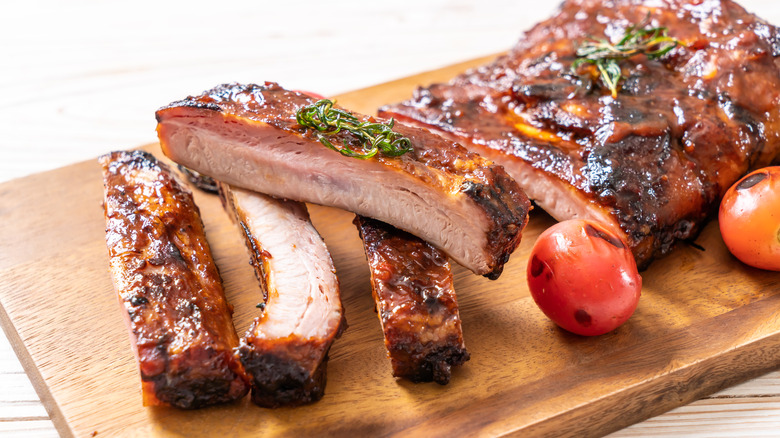What To Consider To Avoid Overcooking Your Ribs
Juicy, savory ribs are what we all aim for when we're firing up our barbecue grill to make this dish. But if you're not careful, the texture of your meat can quickly go sour. No one likes eating overcooked beef or pork ribs, which quickly morph from succulent to tough and dry, or even soggy if you leave them over the heat for way too long.
But when trying to cook your meat for just the right amount of time, there are a few factors to take into account besides just how long it stays on the grill. To get the complete rundown, we picked the brain of Aaron Franklin, pitmaster extraordinaire and owner of the famous Franklin BBQ. Franklin is partnering with The Vines Global on a cooking master class and summit in Mendoza, Argentina, Smoke & Fire. "How fast is the meat cooking? How far do you think they will carry-over? What's the preferred texture? Will it be sauced?" These are the questions you should be asking yourself according to Franklin.
Making perfect ribs requires practice and finesse
One variable that can affect how fast your ribs cook is the type of meat that you're using. Beef ribs, for instance, generally need to stay on the heat a little longer than pork because of their higher fat and connective tissue content. But even though you can have an estimate in mind for how long your protein will take, Franklin says to always keep an eye on it each time you make it.
"There is no exact internal temperature that you can get consistent results from, but using a thermometer can be a great indicator of what is going on," Franklin said. "Spend your time cooking to gather data about how your cook is going and try your best to make an educated decision about when to pull meat from the cooker." The skewer test can also give you an idea of when your ribs are done, which involves sticking a toothpick (or skewer) in and gauging how tender the meat is.
Franklin also warns that meat isn't always finished cooking when you take it off the heat. Ribs typically don't need much time to rest since they're so thin (about five minutes should be enough), but you'll want to keep this in mind for thicker meat varieties. "This is the one of the most challenging parts of cooking BBQ, it just takes practice," Franklin said.

